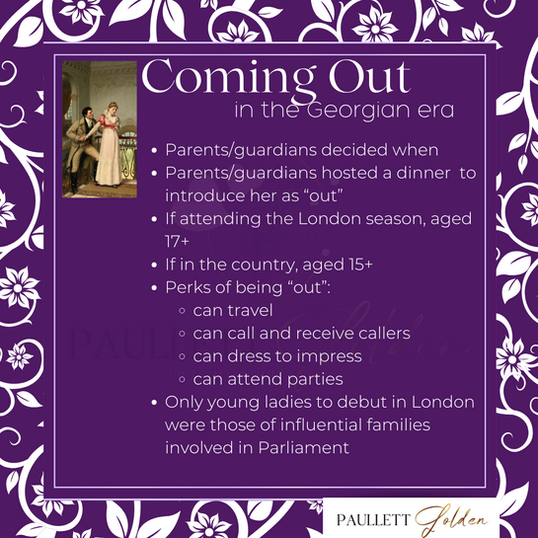Real People. Real Conflict. Real Romance.
Historical Romance
in the style of Jane Austen

Coming Out in Society
A glimpse of what it meant to be "out" in Georgian era England
What types of heroines do you enjoy the most? Those coming out into society and experiencing their first season, a more mature heroine who has been out in society for a year or more, a spinster, or possibly even a widow?
For a young lady to be considered “out,” she need not experience a debut, first season, come out ball, or otherwise. To be “out” only means her parents consider her mature enough to participate in social events (and be eligible for marriage). It was rare, even amongst the wealthiest families, for a young lady to have a debut ball. An engagement ball, yes, but rarely ever a debut ball.
If not yet out, she is, regardless of age, considered still in the “school room,” learning how to become a young lady. This means she is restricted socially:
· No travelling
· No parties
· No dancing
· No afternoon calls
· Off to bed before festivities begin
· Familial company and immediate neighbours her exclusive companions
To be “out” means her mother or guardian has declared she is ready for socialising. This can be achieved by the family hosting a dinner for neighbours and the young lady attending the dinner or by calling on a neighbour for the first time. If she’s “out,” she can:
· Call on neighbours
· Receive callers
· Attend parties
· Travel with family and friends
· Stay awake past her bedtime
How a young lady would come out into society depended on her family’s standing and social inclinations. Far fewer young ladies would experience a London season than you might think. The only young ladies who would be offered a season were those whose family were often in London and participated in the Parliamentary Season politically and socially.
Not all aristocratic families participated socially, even if the head of the household was politically active, and not all aristocratic families saw the purpose of a formal debut since the more austere the family, the more likely their daughters would already have a marriage partner chosen.
A formal debut with a London season would involve a curtsy to the queen (possibly), attending at least one ball to display one’s accomplishments (to the bachelors), and calling on ladies of influence with whom the family held a connection.
A season was far more complex (as we’ll explore in future post, and exceedingly expensive, as discussed in a previous post) than one might think, and a young lady could not have a season at all without a well-established sponsor who was willing and able to secure invitations, present her at Court, help secure the needed attire, etc. It was no simple task and only married women who were established in London society and had taken their own curtsy before the queen could sponsor and present a young lady. Speaking of curtsying to the queen—this wasn’t all that popular. The first appearance of anything like this was when Queen Elizabeth I chose to have women presented to her so she could choose her ladies in waiting. We don’t see this again until Queen Charlotte opens her drawing room socials, and part of this is to have the young ladies from the most influential families be introduced to her. If a young lady wasn’t from one of these influential families, she wouldn’t have attended or curtsied. Even then, this was such a new element of the season, not every influential family saw the need. It wasn’t until Queen Victoria that we see this become an important element of the debut.
Gentry families and commoners did not often participate in the London season nor have formal debuts, not unless the head of the family was a Member of Parliament and expected his family to participate in the social season when Parliament was in session. For a country debut, a young gentlewoman would call on friends and family with her mother or guardian as the introduction to her being “out” in society. She would, if applicable, attend a village assembly.
The ages of coming out differed. Those anticipating a first London season were often around 17-18 years of old. Those in the country with no anticipation of a London season would often come out earlier, around 15-16.
And no, young ladies coming out into society were not called debutants, at least not until later in the century. The term “debutant” referred to an actress, definitely not someone to confuse with a young gentlewoman.
A few absolute must reads and views on the topic:
Ellie Dashwood’s “The Regency Era Marriage Season”: https://www.youtube.com/watch?v=OwUcb9SE_7A
Regina Jeffers, “A Young Lady’s ‘Come Out’ in Regency Society”: https://reginajeffers.blog/2023/02/27/a-young-ladys-come-out-in-regency-society/
Donna Hatch of Historical Hussies, “Fun Facts About Coming Out in Regency”: https://historicalhussies.blogspot.com/2016/11/5-fun-facts-about-coming-out-in-regency.html
